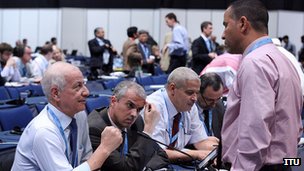Russia backtracks on internet governance proposals
- Published

The US ambassador to the conference had said he was "disappointed" by the Russian-backed proposals
Russian-backed proposals calling for 193 countries to be given "equal rights to manage the internet" have been pulled at a UN conference in Dubai.
The US had threatened to block the suggested additions to an international communications treaty.
It wants the treaty to make minimal reference to the internet, warning to do otherwise risks state interference.
Russia and its partners are now redrafting their document and are expected to submit it later.
Attendees at the World Conference on International Telecommunications (Wcit) have until Friday to renegotiate the 24-year-old treaty.
The UN agency hosting the event - the International Telecommunication Union (ITU) - had earlier pledged not to put any disputed changes to a majority vote, saying there had to be full consensus.
Internet addresses
Russia had first put forward its net governance proposal ahead of the conference, but it emerged on Friday that it had found support from other countries.
The United Arab Emirates announced the details would be submitted to the ITU at the beginning of this week. But before that could happen a draft of the proposals was published by website Wcitleaks., external
It revealed that the UAE, China, Saudi Arabia, Algeria and Sudan were the other countries signed up to the so-called "compromise document".
Wcitleaks also named Egypt, but it issued a statement to say that it did not support the proposals.
One of the most controversial suggestions was a call for member states to be given equal rights to manage "internet numbering, naming, addressing and identification resources".
This would mark potentially mark a shift from the current system in which the US government decides who runs the Internet Assigned Numbers Authority (Iana) - the body responsible for regulating the net's address system.
It has this power as a legacy of its funding for Arpanet - a precursor to the internet which helped form its technical core.
While some other countries see this as an anachronism, the US says it allows it to ensure that technical experts can make "agile, rapid-fire decisions" about the net's development as part of multi-stakeholder organisations, and to change this would risk the process getting slowed down by bureaucracy.

The UN's conference is being held in Dubai
It also makes a wider point that attempts to add sections to the treaty about the internet could later by used by governments to legitimise interference into the operations of internet service providers (ISPs) and cloud-based operations such as Google or Facebook, "opening the door to censorship".
However, others says the references are needed to help countries co-ordinate cybersecurity and anti-spam efforts.
Revised proposals
After the US made clear that it would oppose the document's proposals its backers subsequently decided not to file it in its current state.
The ITU says it expects an amended version will be delivered later, but adds that it will not released it for public view until it has been translated into a range of other languages.
The US gave a guarded response to the news.
"While this is a welcome development, these issues will continue to be on the table for discussion in other forms during the remainder of the conference," said the US ambassador to Wcit, Terry Kramer.

Delegates at the conference have until Friday to agree the text of the revised treaty
"The United States will continue to make the case that Wcit should maintain the scope of the international telecommunication regulations and resist proposals to extent that scope into internet governance or content."
The Russia-backed group has not issued a statement at this time, however the ITU stresses that if the revised document is still opposed by the US, it will not be adopted.
"If it contains text that doesn't have majority support it won't be acceptable to the conference," a spokeswoman told the BBC.
"So they're trying to remove the bits that people won't agree to and see where people might be prepared to bend a little bit."
- Published10 December 2012
- Published4 December 2012
- Published21 November 2012